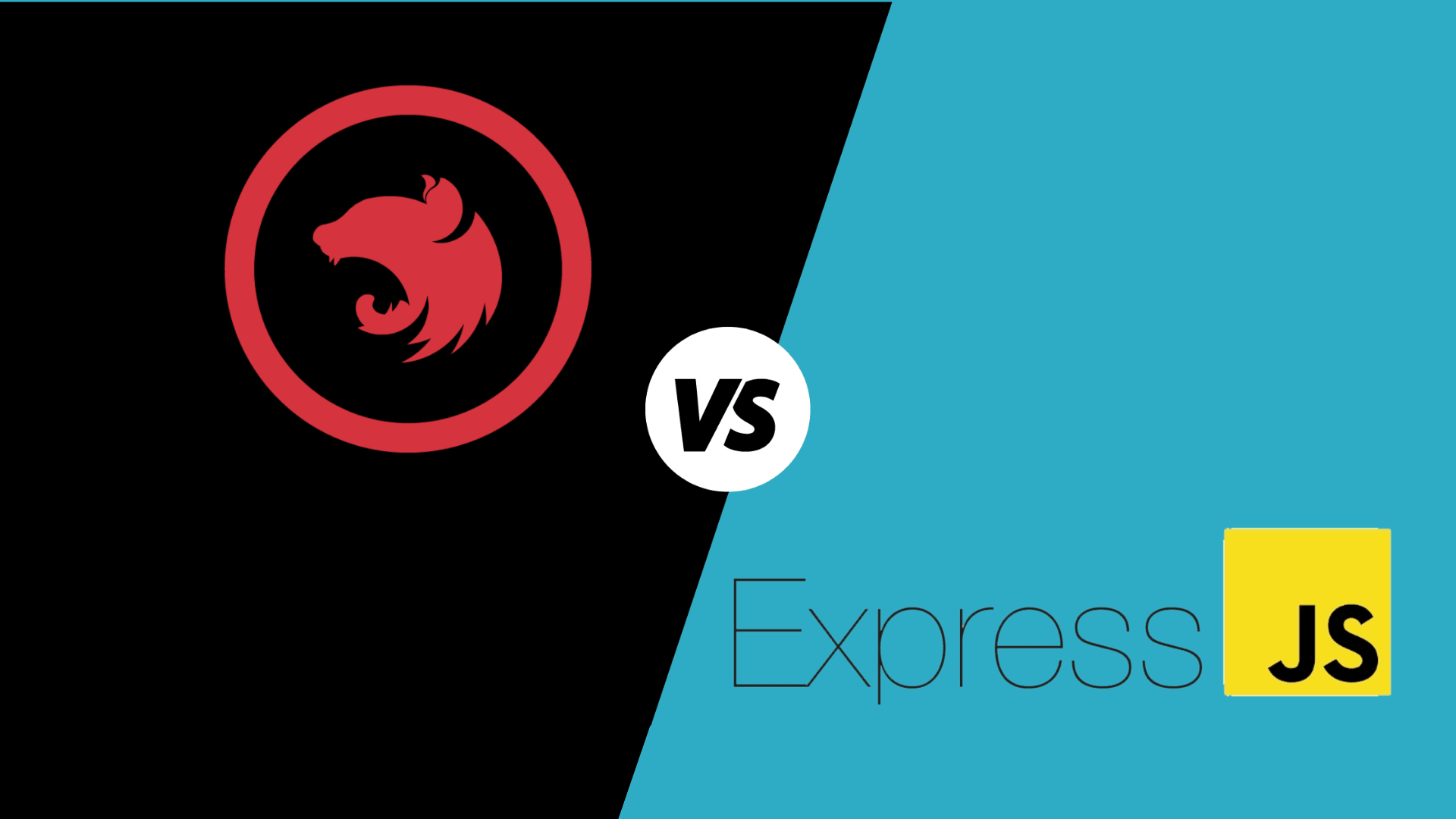Are you planning to build a web application? Which one are you going to use - NestJS or ExpressJS?
In recent years, ExpressJS has become the de facto choice for building web applications. It is fast, flexible, and minimal. But while building large-scale applications, developers often prefer lightweight frameworks. Due to this, NestJS is gaining popularity as it continues to grow.
Both Nest and Express are two of the most popular Node.js frameworks today. If you want to choose one of them, you first need to understand their features and differences. If you are new to both, don’t worry. We will start from the basics.
What is the Node.js framework?
Node.js is an open-source, cross-platform, runtime JavaScript environment that enables you to write server-side applications. It runs on Google Chrome’s V8 JavaScript engine and thus runs JavaScript outside the web browser.
Ryan Dahl created the framework in 2009. Before that, you could use JavaScript only to build client-side applications (front-end). With Node.js, you can develop server-side and networking applications. It can open, close, read, write and delete files on the server and modify the data in the databases.
Thus, you can write both front-end and back-end to create a full-stack website with JavaScript using Node.js. But creating a web application would take a lot of time. To make it fast and easy, you need a web application framework like NestJS or ExpressJS.
What is NestJS?
NestJS is an open-source framework that helps you build scalable Node.js server-side applications. Heavily inspired by Angular, it is built on Typescript and uses progressive JavaScript. It has a simple design with 3 main components: controllers, modules and providers.
Controllers: They handle the incoming requests and return responses to the client-side.
Providers: These are the fundamental concepts of NestJS that you can treat as services, repositories, factories, helpers, etc. You can create and inject them into controllers or other providers as they are designed to abstract any complexity and logic.
Modules: These are the classes. A module is a reusable chunk of code that has a separate functionality. The entire source code is organized and structured into modules. Each application will have at least one root module which is the starting point.
Features:
- It combines the elements of OOPs (Object-Oriented Programming), FP (Functional Programming), and FRP (Functional Reactive Programming).
- It supports various databases like PostgreSQL, MongoDB, MySQL, Redis, Apache Cassandra, etc.
- NestJS is platform agnostic - it uses Express by default but you can configure it to work with any HTTP framework like Fastify.
- It provides a wide range of functionalities, APIs, and libraries so that developers can build applications with fewer lines of code.
- It was created for building Monoliths and Micro-services.
- It contains a built-in Dependency Injection container thus keeping your code clean, and easy to read and use.
- You can easily integrate with technologies such as Mongoose, TypeORM, GraphQL, and concepts like Logging, Validation, Caching, and Web Sockets.
Pros:
- Leverages TypeScript, a superset of JavaScript
- Active codebase development
- Detailed and well-maintained documentation
- Easy to learn, use and master
- Powerful CLI (Command Line Interface)
- Open source (MIT License)
- Easy unit-testing
Cons:
- Need to know TypeScript.
- Lack of user-base
- Less support and solutions available online
Companies that use NestJS
Some of the companies that use Nest are:
- Adidas
- Capgemini
- Decathlon
- Autodesk
- Swing
- Shipt
- Crowdlinker
- Trellis
- Valor Software
- Trilon
- Roche, etc.
What is ExpressJS?
ExpressJS is a free, open-source web application framework for Node.js. It provides various features to quickly and easily build web applications using javascript. It is a layer built on top of Node.js that helps in server and route management. Since it is written in javascript it allows absolute beginners to get into web development.
Features:
- It is the backend part of MEAN (MongoDB, ExpressJS, AngularJS, and NodeJS) technology. It handles routing, sessions, HTTP requests, error handling, etc.
- It was created to easily build APIs and web applications. You can easily build single-page, multi-page, and hybrid web applications. You can even use it to build mobile apps.
- It provides various middleware modules to respond to HTTP requests and perform other tasks. Middlewares are functions that have access to databases, client requests, and other middlewares.
- You can define application routes using HTTP methods and URLs. Express’s sophisticated routing mechanism preserves the state of the webpage.
- You can write database queries on Express and it easily connects with databases such as MongoDB, Redis, MySQL, etc.
- It offers template engines allowing you to create dynamic content for the web pages.
Pros:
- Saves a lot of coding time.
- Easy to learn if you know javascript.
- Simple to set up, configure and customize.
- Easy to integrate with other engines.
- Single language for both front-end and back-end.
- Strong and supportive online community.
Cons:
- Not easy to understand error messages.
- Many callback issues.
- Code organization sometimes difficult to understand
- Suitable for only small and medium projects. Not for large projects.
Companies that use ExpressJS
Some of the companies that use ExpressJS for their apps are:
- Netflix
- IBM
- eBay
- Uber
- PayPal
- Fox Sports
- Accenture
- Myntra
- Taskade
Differences between NestJS and ExpressJS
Now let’s compare the important aspects of both the frameworks so that you better understand their differences.
| Factors | NestJS | ExpressJS |
|---|---|---|
Opinionated & unopinionated | Nest focuses more on conventions and principles than configurations and provides standard tools and code in the right manner. Hence, you are less likely to face any issues and develop applications that are less prone to error. | Express doesn’t have pre-defined rules that you need to follow. You can make assumptions and experiment a lot with your code and its implementation. This is useful for smaller teams with small projects but the lack of structure poses a problem for bigger teams and larger projects. |
Architecture | Nest follows the MVC design pattern | Express doesn’t follow MVC design pattern |
Typescript | NestJS is written in and supports TypeScript. As TypeScript follows status typing and includes a “type” feature, Nest is more reliable and suitable to develop large-scale applications | Express doesn’t support TypeScript because of which your application may not run on multiple browsers. |
Performance | NestJS incorporates CLI (Command Line Interface) allowing you to directly give commands without writing long lines of code | ExpressJS is asynchronous and you can execute multiple operations independently. But it is not scalable and has poorer performance than Nest. |
Popularity | Nest is slowly gaining popularity as more and more people are shifting from Express to Nest. It ranks second among the top Node.js frameworks on GitHub with Express taking first place. Some of the companies that use Nest are Adidas, Capgemini, Decathlon, Autodesk, etc. | ExpressJS is the older framework, it is the most popular and has a bigger user base. There are thousands of companies that use this framework like Netflix, IBM, eBay, Uber, PayPal, Fox Sports, Accenture, Myntra, Taskade, etc. |
Unit Testing | Unit Testing is pretty easy and faster with NestJS as its CLI includes a default testing environment configured in Jest. It creates a spec file when a service, interceptor, or controller is created which includes an auto-generated testing bed code. Thus, you don’t have to write extra code for unit testing. | In ExpressJS, you need to write separate code for the sake of testing. This is not only time-consuming but slows down the application’s productivity rate. |
1. Opinionated & unopinionated
The main difference between both frameworks is that NestJS is opinionated while ExpressJS is unopinionated.
An opinionated framework means that it has a proper style or way of doing things. It has a proper structure and is less diverse. An unopinionated framework gives complete freedom to the developers and is very diverse but less structured.
Nest focuses more on conventions and principles than configurations and provides standard tools and code in the right manner. Hence, you are less likely to face any issues and develop applications that are less prone to error.
Express doesn’t have pre-defined rules that you need to follow. You can make assumptions and experiment a lot with your code and its implementation. This is useful for smaller teams with small projects but the lack of structure poses a problem for bigger teams and larger projects.
2. Architecture
Another difference between the two is their architecture. Nest follows the MVC design pattern while Express doesn’t.
NestJS provides ready-to-use components like controllers, providers, and modules with which you can easily implement UI and control logic and data. As ExpressJS doesn’t follow MVC, there is no proper structure. As a result, your application might end up being inefficient and less optimized.
MVC is a design pattern that divides a software application into three main logical components: Model, View, and Controller. The Model handles all the data logic, the View is the User Interface and the Controller controls the data flow between the Model and View.
3. Typescript
As you already know, NestJS is written in and supports TypeScript. As TypeScript follows status typing and includes a “type” feature, Nest is more reliable and suitable to develop large-scale applications. Express doesn’t support TypeScript because of which your application may not run on multiple browsers.
4. Performance
NestJS incorporates CLI (Command Line Interface) allowing you to directly give commands without writing long lines of code. Dependency Injection allows you to add as many dependencies as you need to run your application smoothly. It also supports third-party plugins.
ExpressJS is asynchronous and you can execute multiple operations independently. But it is not scalable and has poorer performance than Nest.
5. Popularity
As ExpressJS is the older framework, it is the most popular and has a bigger user base. There are thousands of companies that use this framework like Netflix, IBM, eBay, Uber, PayPal, Fox Sports, Accenture, Myntra, Taskade, etc.
However, Nest is slowly gaining popularity as more and more people are shifting from Express to Nest. In fact, it ranks second among the top Node.js frameworks on GitHub with Express taking first place. Some of the companies that use Nest are Adidas, Capgemini, Decathlon, Autodesk, etc.
6. Unit Testing
Unit Testing is pretty easy and faster with NestJS as its CLI includes a default testing environment configured in Jest. It creates a spec file when a service, interceptor, or controller is created which includes an auto-generated testing bed code. Thus, you don’t have to write extra code for unit testing.
In ExpressJS, you need to write separate code for the sake of testing. This is not only time-consuming but slows down the application’s productivity rate.
7. Use cases
Let’s consider Single-page applications (SPA) - a development strategy where you route the entire app from a single index page. You can use both Nest and Express to build SPAs. While NestJS’s serve-static module allows you to build SPAs faster, ExpressJS allows you to create an API to connect SPAs and serve data regularly.
Another use case can be enterprise-level web applications and ecommerce applications. NestJS is better suited for these as it is scalable, well-structured, and great for building large web applications.
For building fintech and streaming applications, ExpressJS is better suited. This is because live streaming is complex with multiple levels of data streams and Express can efficiently handle asynchronous data streams.
Conclusion
Both ExpressJS and NestJS are popular web development frameworks that are easy to learn and get started. They both have their pros and cons. So, choose the one that is best suited for your project. We hope the above differences on ExpressJS vs NestJS and the use cases have given you enough information to make your decision.

